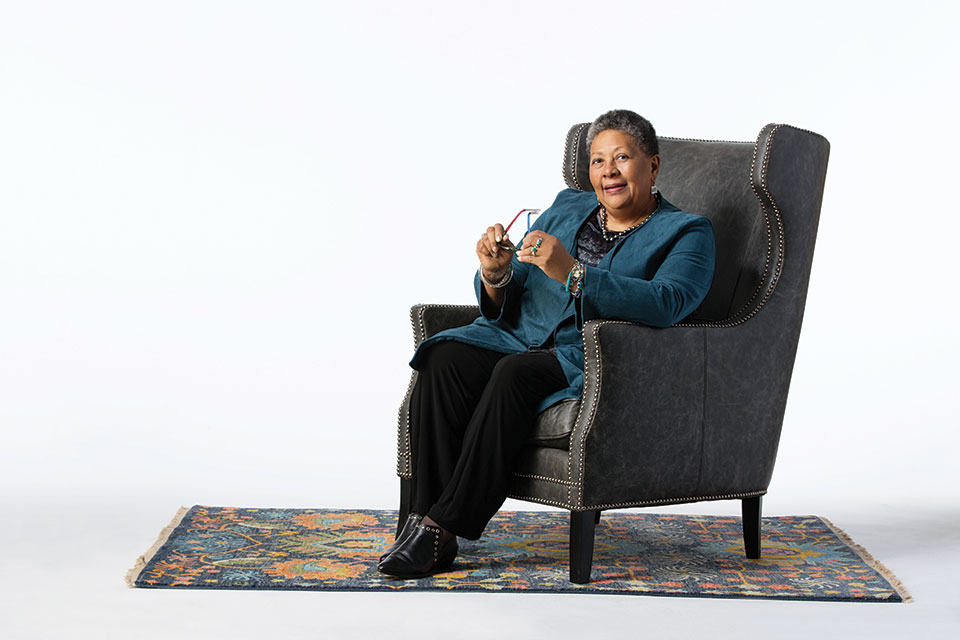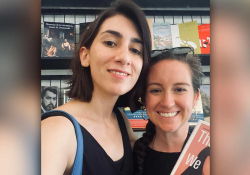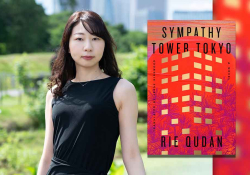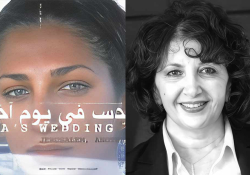Telling It Slant: A Conversation with Marilyn Nelson

I had the privilege of sitting down with Marilyn Nelson the day before she was awarded the 2017 NSK Neustadt Prize for Children’s Literature, which honors her incredible career as an author and a poet. We discussed not only poetic form and writerly ancestors but, perhaps most importantly, the ways in which writers can use not only personal anecdotes but a reimagining of history in order to learn, educate, and advance social progress.
Sarah Warren: So much of your work is formally rendered, particularly as sonnets. What is it about the sonnet that brings you to choose it over other forms?
Marilyn Nelson: What about the sonnet touches me, I guess . . . I taught a course on the sonnet several times, and one of the things that impresses me about the sonnet is that it apparently came into existence as a way to replicate the perfect proportions of Greek temples and of the golden mean. So, when the Petrarchan sonnet was invented, it was an attempt to create a poem with perfect proportions. I just find that fascinating—I love the idea of trying to write a perfect poem. And you know, it’s been watered down by people like Shakespeare. But there still is something about going into the form and recognizing an internal logic to the form, and once you’ve written several—maybe twenty-five or fifty sonnets—you recognize that the proportions, you know, they happen naturally.
Warren: Do you think the form alters the way people perceive the content of the poem?
Nelson: I think so; I think it’s unconscious. I’ve often been surprised by poems that we love—poems like the hundred best-loved poems—fifty of them will be sonnets, and we don’t recognize that they’re sonnets. We just know that it’s a pretty poem. I think there’s something in the form itself that gives pleasure. I think poems should both please a reader and teach the reader something, and if you can achieve both of those things, then you’re doing something.
Warren: Yeah, and I think we can all recognize a sonnet just by the shape of it, the way it looks on the page. As I was reading some of you work, I was reminded that sonnets have historically become known to have love content, and I heard someone say once that every poem should be a love poem, no matter what it is. And so, I was thinking about that as I was reading your work—yeah, these are all love poems in their own way.
Nelson: Yes, I suppose that’s true, although revolutionary sonneteer Claude McKay, who was a Harlem Renaissance writer, wrote sonnets that took the subject matter to a completely new level. But that’s true—they’re also love poems because they’re about loving oneself and loving one’s people and loving the planet. And why shouldn’t those be love poems?
I really enjoy doing research and learning things before I start writing. I don’t like to spin poems just out of myself and my own experience. I like to learn something in the course of writing.
Warren: I love it, I love it. We’re going to apply that to your poems from now on! Now, for the next question—in your poem “To Miss Jackson,” you mention reading Langston Hughes, Countee Cullen, James Weldon Johnson, and Gwendolyn Brooks. How would you situate your own poetry in relation to the broader African American literary tradition?
Nelson: Well, I—certainly have been influenced by the ancestors. I’ve taught African American literature for many years, and I hope I’m carrying the tradition further, maybe a couple of steps further. I just had a conversation recently about Jean Toomer, who’s being inducted into the Poets Corner next Sunday at the Cathedral of St. John the Divine, and I was saying that what I think Toomer did was take Langston Hughes’s idea of the racial mountain—that the Negro artist has to climb up the racial mountain—and Toomer showed that you can get to the top of the racial mountain, and then what do you do? Toomer leapt off the mountain! And in some ways I think that I am part of a generation that is trying to continue that struggle up the mountain of self-definition but also trying to take steps off the peak of that racial mountain.
Warren: Do you ever find your work in conversation with any of those artists specifically?
Nelson: Well, I’ve written a couple of Golden Shovels—Terrance Hayes’s invention of a form that uses a line from a Gwendolyn Brooks poem . . . and in my book about Emmett Till there are references to a poem about lynching by Dunbar, I think, and there’s a reference to a poem by Richard Wright. But it’s kind of accidental—I’m not that conscious of those things.
Warren: Right, it just occurs to you as the muses give it to you.
Nelson: Right, right.
Warren: So, this kind of segues nicely into my next question. What inspires you the most right now (in terms of others’ work, or world events, or anything else), and do you engage in a dialogue with those inspirations in your own work?
Nelson: Well, I don’t know if I would call this inspiration, or whatever the opposite of inspiration is, but the current political situation has forced me to write poems that I wouldn’t ordinarily write. And I don’t usually write about current events, but I find it very hard not to right now. I’m more inspired by history than by anything else. I don’t have a project I’m working on right now, but I imagine, if and when I do have a new project, it probably will be historical. I really enjoy doing research and learning things before I start writing. I don’t like to spin poems just out of myself and my own experience. I like to learn something in the course of writing.
Warren: How do writing and teaching intersect for you?
Nelson: Well, I’m retired, so I’m not teaching too much anymore, and when I was teaching full time, I was teaching mostly literature—I didn’t teach in an MFA program, so I wasn’t writing alongside my students. What has happened several times is that I would be working on something of my own, writing something of my own, and ask my students if they would mind listening to what I was working on. One semester I taught a graduate seminar on African American women’s slave narratives, and that same semester I was asked to do a rendition of Euripides’ Hecuba. Hecuba was a queen of Troy who, when Troy lost the Trojan War, was taken as a slave to Greece, along with a lot of other Trojan women. Reading that play—I was reading it line-by-line, word-by-word, working on finding my own words for it—reading that alongside these slave narratives was galvanizing. It was horrible and wonderful at the same time. Occasionally I would have worked on one speech and ask my class, my graduate students, if they would mind listening to twenty lines of what I had done with this speech, and they were very helpful. They were really responsive—I mean, I didn’t take up a whole hour on my work, but it was very useful to have them allow me to use them as my sounding board. I think that’s the best example I have of that.
Warren: I know you’re retired and that you teach a workshop here and there, but as a writer with your work out in the world, you’re always teaching somebody something through your writing, right? So what do you hope that people gain, or learn, or experience from your writing?
Reading Hecuba—I was reading it line-by-line, word-by-word, working on finding my own words for it—reading that alongside these slave narratives was galvanizing.
Nelson: I think that my work tends to be celebratory, and what I hope is that it teaches people to recognize the pain and difficulty that’s always there in the place, the way we inhabit the planet, but also the way we move forward by celebrating our presence. Celebrating the gifts that are presented to us by the planet. A lot of my books are published for young readers, and in those books I’m especially interested in teaching about history; teaching about curiosity; teaching about what it means to be human—and to live among human beings that may not agree with us, who may not want to accept us, but who need to be taught. I hope that’s what my work is teaching.
Warren: I love that you can do that through work for children and young people, too; it’s a great way to do that. Okay, this might be a hard question. What do you think is a writer’s role in our increasingly divisive and anti-intellectual world?
Nelson: I don’t know—I had a conversation with someone recently about this. I said—which is probably politically incorrect—that I don’t know that the writer has a responsibility to take on the divisions of the world. I think an individual has that responsibility, but I’m not sure I would go so far as to say that a writer has to give their work to this. I think you write what’s given to you to write. But I think we have responsibilities as human beings to confront the—what is the word you use . . .
increasingly divisive—I think as people we have to confront those things. If what we are writing is true, if the muse is giving us truth to write, then truth is always truth to power. Whether we speak it—what is it Dickinson says . . . tell the truth, but tell it slant—whether we’re telling it slant or not, you know, we’re teaching it, we’re speaking it, and people who are aware will receive it and recognize it. I think that’s what I believe.
I suspect that it is equally important to just speak truth, not to speak about the specific situation we’re living in now, but to speak a kind of wider, larger truth.
I’m not sure I know many writers who are giving their work lives to protesting what’s going on now, but I suspect that it is equally important to just speak truth, not to speak about the specific situation we’re living in now, but to speak a kind of wider, larger truth. Again, as I said earlier, I don’t know if this is politically incorrect. I feel a little uncomfortable about saying it.
Warren: I’ve had this conversation a lot with my students in the past—about what an artist’s responsibility is, and I think, ultimately, it is just that she or he keeps creating.
Nelson: Yes—I really do believe that work is given to you. If that’s the work that’s given to you, then you write that work. And it may have nothing to do with who’s in the West Wing, it may be completely personal—but if it’s true, it’s teaching people about what it means, and what it’s like, to be human.
November 2017









